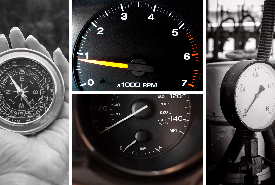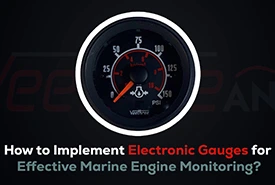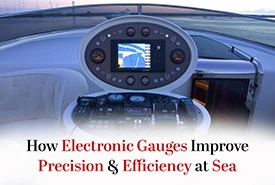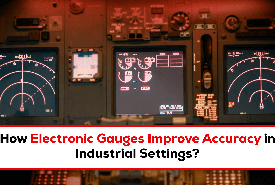- Free shipping for NZ Customers. All items are available in NZ warehouse
- +64 (0) 212576146
- [email protected]
Make the Switch to Electronic Gauges for Better Performance Tracking

Upgrade Your Equipment with Digital Gauges for Better Accuracy
October 7, 2024
How to Maintain Digital Gauges for Long Term Performance in Marine Settings?
October 22, 2024Ever found yourself squinting at an analogue gauge, trying to figure out if that needle is exactly where it’s supposed to be? Or maybe you’ve struggled with gauges that just don’t seem to give accurate or consistent readings.
If that sounds familiar, it’s time to consider switching to electronic gauges. These modern tools provide real-time, precise data that make monitoring your systems a breeze.
In the following sections, we’ll dive into how electronic gauges work, their benefits, and why they’re the perfect upgrade for accurate performance tracking.
Why Performance Tracking Matters?
Performance tracking is more than just keeping an eye on numbers; it’s about ensuring your systems run efficiently and safely. In various settings—like marine environments, industrial sites, and automotive applications—accurate monitoring is key to avoiding breakdowns, improving efficiency, and keeping operations safe.
Avoiding Costly Breakdowns
Monitoring systems closely can help prevent small issues from turning into major problems. For example, in a marine environment, precise tracking of engine temperature or oil pressure can alert you to potential problems before they cause damage. Electronic gauges provide accurate, real-time data that makes it easier to spot issues early and act on them promptly.
Boosting Efficiency
Accurate performance tracking allows you to fine-tune your equipment for optimal efficiency. For example, keeping a close watch on fuel consumption or engine performance helps you make adjustments that reduce waste and save money. With electronic gauges, you have reliable data that helps you make informed decisions, ensuring your operations are as efficient as possible.
Ensuring Safety
Safety is a top priority in any environment, and electronic gauges play a crucial role in maintaining it. Whether you’re managing a vessel at sea or heavy machinery on a construction site, having accurate, up-to-date information is essential for safe operations. Gauges that provide real-time feedback help you respond quickly when something goes wrong, minimising risk and protecting both people and equipment.
Key Benefits of Switching to Electronic Gauges
Upgrading to electronic gauges offers numerous benefits, making them the preferred choice for professionals in various industries. Here’s a look at the key advantages:
Versatility Across Different Settings
Whether you’re on a boat, managing industrial equipment, or working with vehicles, electronic gauges are designed to adapt to various environments. Marine gauges, for example, are built to resist water and withstand the unique challenges faced at sea, ensuring that you get accurate readings no matter where you operate.
Advanced Features for Better Monitoring
Many electronic gauges come with built-in features like alarms and data logging. Alarms alert you when readings fall outside safe parameters, allowing for quick action to prevent damage or accidents. Data logging helps you keep track of performance trends over time, providing insights that can help optimise operations.
Reduced Maintenance Needs
Traditional gauges with mechanical parts often require frequent maintenance and calibration to stay accurate. Electronic gauges, on the other hand, are designed to be more stable and reliable, reducing the need for constant upkeep. This means you save time and resources while ensuring your equipment remains in top condition.
Increased Durability and Longevity
Electronic gauges are built to last. They are designed to handle vibrations, temperature changes, and exposure to harsh elements, making them suitable for demanding environments. This durability ensures you get long-term use from your gauges, minimising the need for frequent replacements.
Customisable and User-Friendly
Electronic gauges offer customisation options that traditional models don’t. You can set alarms for specific conditions, adjust display settings for better visibility, and even connect some gauges to monitoring systems for remote access. These features make electronic gauges user-friendly and adaptable to your specific needs.
Why Making the Switch to Electronic Gauges Is a Smart Investment?
Switching to electronic gauges is more than just upgrading your tools; it’s an investment in better performance and reliability. Here’s why making the switch makes sense:
1. Increased Efficiency and Productivity
With precise, real-time data at your fingertips, you can make quick adjustments that improve overall efficiency. Accurate monitoring helps you identify areas where performance can be optimised, leading to smoother operations and better productivity. In marine applications, this could mean adjusting fuel usage for longer trips or monitoring engine conditions to avoid disruptions.
2. Reduced Downtime and Maintenance Costs
Digital gauges provide early warnings for potential issues, allowing you to address them before they escalate into major problems. This proactive approach minimises downtime, keeps equipment running smoothly, and reduces the risk of costly repairs. Since electronic gauges require less frequent calibration and maintenance than traditional gauges, they help lower long-term maintenance costs.
3. Enhanced Safety and Reliability
Safety is a top priority in any operation. Electronic gauges contribute to a safer environment by providing accurate readings and alerting operators when conditions become unsafe. This allows for quick action to avoid accidents or equipment failure. The reliability and precision of electronic gauges mean you can trust the data you’re receiving, which is essential when making critical decisions in high-stakes environments.
4. Long-Term Cost Savings
While electronic gauges may have a higher initial cost compared to traditional options, the benefits they provide lead to long-term cost savings. Accurate monitoring reduces waste, optimises performance, and prevents costly breakdowns, ultimately saving money. The durability of electronic gauges also means fewer replacements, further reducing expenses over time.
5. Adaptability to Modern Systems
Electronic gauges are compatible with modern equipment and monitoring systems, making them versatile tools that can adapt to various environments and applications. From marine systems that need water-resistant gauges to industrial setups that require rugged, vibration-proof devices, electronic gauges offer solutions for a wide range of needs. Their advanced features, like data logging and remote connectivity, allow for seamless integration into existing setups, making them an easy upgrade for any operation.
Our Verdict
Making the switch to electronic gauges is a smart move for anyone looking to improve performance tracking, enhance safety, and boost efficiency. By choosing the right gauges and maintaining them properly, you’ll have access to accurate, real-time data that keeps your operations running smoothly.
Whether you’re in a marine environment, an industrial site, or managing a fleet of vehicles, electronic gauges provide the precision and reliability needed for success.
Investing in electronic gauges is not just about keeping up with technology; it’s about making a practical decision that leads to long-term benefits. With less maintenance, increased accuracy, and advanced features, electronic gauges are a valuable addition to any system.
So, if you’re ready to improve your performance tracking and ensure your equipment operates at its best, it’s time to make the switch to electronic gauges.




